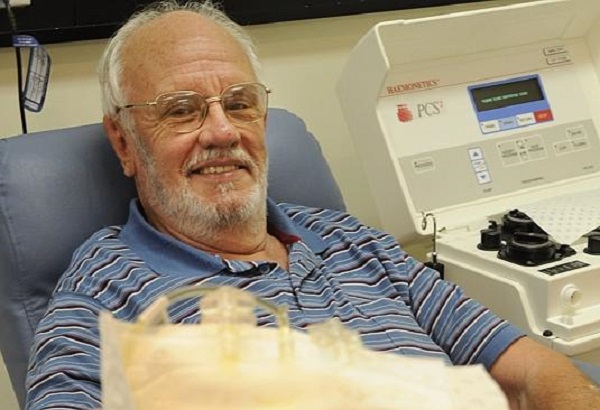In Australia, 78-year-old James Harrison is considered a national hero for saving two million newborn babies by donating his plasma. According to Fox News, Harrison has a rare blood type that contains life-saving antibodies.
In fact, some are calling him “The Man with the Golden Arm”.
His remarkable antibodies were developed during a chest operation when he was 14-years-old. Harrison decided to start donating after his father explained to him that blood donations saved his life, and for the past 60-years he has been donating every week. From his blood, doctors were able to create a vaccine called Anti-D, which protects unborn babies when their mothers have Rhesus disease. The condition is a severe form of anemia that can cause children to develop jaundice.
Jemma Falkenmire from the Austrialian Red Cross Blood Service said the following about the rare condition: “In Australia, up until about 1967, there were literally thousands of babies dying each year. Doctors didn’t know why, and it was awful. Women were having numerous miscarriages, and babies were being born with brain damage.”
Thankfully, Harrison stepped in and has given blood over 1,000 times. Falkenmire added, “I don’t think anyone will be able to do what he’s done, but certainly we do need people to step into his shoes. He will have to retire in the next couple years, and I guess for us the hope is there will be people who will donate, who will also … have this antibody and become life-savers in the same way he has, and all we can do is hope there will be people out there generous enough to do it, and selflessly in the way he’s done.”
The condition, Rhesus disease, occurs when a pregnant woman’s blood essentially begins attacking her unborn child’s blood cells. It occurs when a pregnant woman has rhesus-negative (RhD negative) blood and her baby has rhesus-positive (RhD positive) blood inherited from his or her father. If a RhD-negative mother becomes exposed to the RhD positive blood— typically during a previous pregnancy with a RhD positive child— she may produce antibodies that eradicate the RhD-positive baby’s foreign blood cells.
Click here to sign up for daily pro-life news alerts from LifeNews.com
The Anti-D vaccine effectively prevents women with RhD negative blood from developing RhD antibodies during pregnancy.
In Australia, where 17 percent of women are at risk of Rhesus disease, Harrison has been the sole donor of these antibodies, saving millions of babies’ lives in the country, but also around the world. His own daughter ended up needing Anti-D, which resulted in his second grandson being born healthy.
“It makes you feel good yourself that you’ve saved a life there, and you’ve saved many more— and that’s great,” Harrison, who added he does not see himself as a hero, told CNN.
Falkenmire called Harrison “irreplaceable” but said the Australian Red Cross Blood Service is hoping another donor with the antibodies will come forward. Harrison can donate blood for only three more years, as the age limit in Australia is 81.








